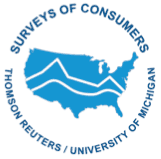
Confidence falls, consumers view government as impediment to growth
October 28, 2013
ANN ARBOR—Consumer confidence declined in October as consumers became convinced that the national government shutdown as well as other restrictions on federal spending would slow the overall pace of economic growth over the next several months, according to the Thomson Reuters/University of Michigan Surveys of Consumers.
Conducted by the U-M Institute for Social Research since 1946, the surveys monitor consumer attitudes and expectations.
Overall, the Consumer Sentiment Index fell to its lowest level since the fiscal cliff crisis in late 2012, and the Consumer Expectations Index reached its lowest level since late 2011. View and download the chart and table (Excel files).
Perhaps the most significant finding, according to U-M economist Richard Curtin, is that consumers have increasingly moved toward the view that government has become the primary obstacle to more robust economic growth. When asked to describe in their own words what they had heard about recent economic developments, the number of consumers that negatively mentioned the federal government in October was the highest in the more than half-century history of the surveys.
“This was the third time in the past three years that negative references to the government’s impact on the economy set another half-century peak level,” Curtin said. “Indeed, after each repeated advance in optimism during the past three years, a revival of the D.C. follies promptly reversed the gain.
“It is hard to imagine how economic uncertainty will decline in the next few months since nothing was settled, only postponed. Nonetheless, the battered consumer will heave a sigh of relief during the brief stoppage between rounds in the D.C. fight. Although pushed to the back burner, concerns about job prospects have significantly worsened during the past year.”
Personal Financial Prospects Weaken
Just 25 percent of all households expected their finances to improve in the year ahead, with half of all families expecting no income increase. Inflation-adjusted income prospects improved slightly from last month, largely due to a decline in the expected inflation rate. Offsetting heightened concerns about prospects for wages and jobs, consumers reported gains in their household wealth, including rising values of stocks and homes.
Slow Job Growth Expected
The near-term outlook for the national economy suffered most from the D.C. stalemate, with unfavorable economic conditions expected by 61 percent in October, up from 50 percent in September. A slowing pace of economic growth meant that consumers anticipated fewer new jobs to be created, reversing the gains recorded a year ago. Indeed, in last October’s survey consumers held the most optimistic expectations for job growth so far in this expansion. In the latest survey, consumers expected the national unemployment rate to edge upward during the year ahead.
Consumer Sentiment Index
The Sentiment Index was 73.2 in October 2013, down from 77.5 in September and last October’s 82.6. Most of the weakness was in the Expectations Index, which fell to 62.5 in October from 67.8 in September and last year’s 79. The Current Conditions Index was 89.9 in October, down from 92.6 in September, but just above last October’s 88.1.
About the Survey

Richard Curtin (Photo by D.C. Goings)
 The Survey of Consumers is a rotating panel survey based on a nationally representative sample that gives each household in the coterminous U.S. an equal probability of being selected. Interviews are conducted throughout the month by telephone. The minimum monthly change required for significance at the 95% level in the Sentiment Index is 4.8 points; for Current and Expectations Index the minimum is 6.0 points. For more information, visit the Surveys of Consumers website at http://new.sca.isr.umich.edu.
The Survey of Consumers is a rotating panel survey based on a nationally representative sample that gives each household in the coterminous U.S. an equal probability of being selected. Interviews are conducted throughout the month by telephone. The minimum monthly change required for significance at the 95% level in the Sentiment Index is 4.8 points; for Current and Expectations Index the minimum is 6.0 points. For more information, visit the Surveys of Consumers website at http://new.sca.isr.umich.edu.
Watch a video about the survey:
Contact:
[email protected] or
Surveys of Consumers, (734) 763-5224 or
Thomson Reuters PR Hotline, (646) 223-7222, ext.1


